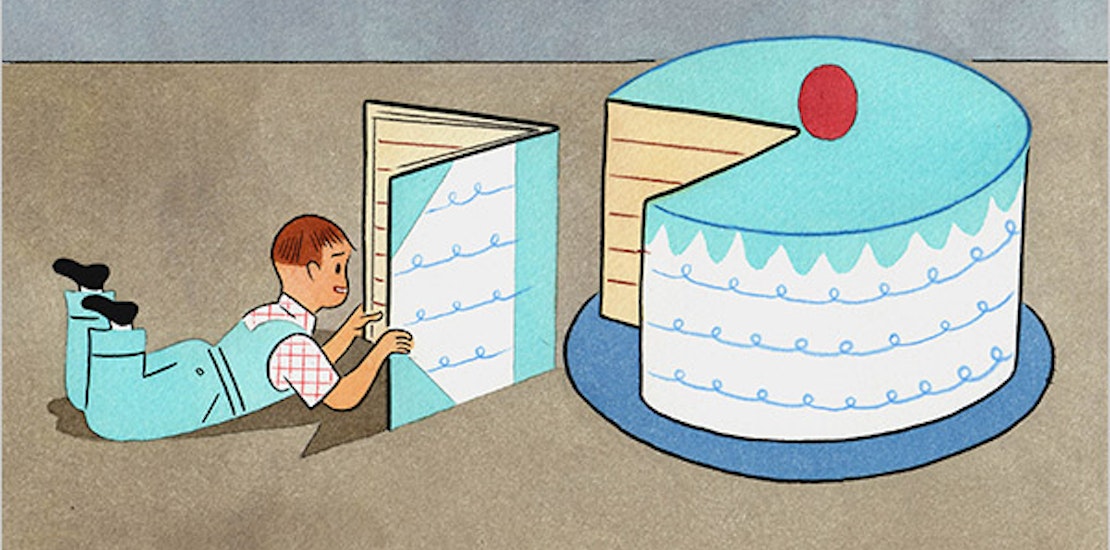For A Job Well Done

The concept of rewarding a child for learning something new or performing well in school is very popular among parents and teachers. From the time our children are babies many of us reward them with both small and large gifts for anything from behaving in a grocery store to bringing home a good report card. There are some however who feel this type of reward system can be damaging to the way a person learns. They believe it can make children work hard for the reward rather than the joy of learning and may even lead to cheating.
A recent New York Times article discusses the effects of rewarding students within our education system. Dr. Barbara Marinak, assistant professor at Penn State opposes the idea of using prizes as incentives and told the New York Times that whether the reward system works or not "continues to be a raging debate." As you can imagine, there is a lot of data in support of both sides of the issue.
Many schools across the country offer incentives to students who perform well on tests as well as teachers who turn out higher scores overall for their class. A school in Dallas, Texas has reported that students who were rewarded scored higher on their SAT and enrolled in college more than those who were not being rewarded. Though this news sounds positive for reward programs, research has also shown that incentives may only work in the short term and have damaging effects in the long term.
A study conducted by Dr. Marinak and Linda B. Gambrell analyzed the effects of rewarding third graders with tokens like toys and candy for reading. The study reported that the reward system actually diminished the amount of time the children spent reading. Dr. Marinak said, "A number of the kids who received tokens didn't even return to reading at all."
With conflicting reports from both sides of the argument, the answer to whether a reward system is beneficial may lie somewhere in the middle. Dr Mark Lepper from Stanford believes that what is being offered as a reward may be an indicator of a reward system's success. Dr. Lepper points out that an incentive program may backfire if you give a child something arbitrary like bubble gum for passing a test. If a system uses rewards that relate better to an activity, like getting to read more books after one book is read successfully, there may be more of a chance of it working.
What do you think of the benefits of reward systems in school and at home?
What kind of incentives do you offer your children for a job well done?
Make a Comment
 by
coldheartedt | sergeant bluff, IA
by
coldheartedt | sergeant bluff, IArewards are needed but schools need to rethingk that types rewards are oppropraite for what age group. little kids are happy with "good job" older kids needs to lear that reward are in for of grands for college to get good grades. im not says unintelegent kids shouldn't try to go to college. but kids that keep there grades up should get more choices at grands vs. kids that slack off half the year & get good grades in the end; just to qualify for grands.
 by
misriz1575 | easton, PA
by
misriz1575 | easton, PAi so agree with reward systems esspeically for student who been doing well the whole shcool year not just the most improved student. when i was younger i failed classes on purpose the first marking term then im prove so that i could be invited to the pizza party at the end of the school year. when i was going to school rewards were not given tothe all around good students you would have to come from a problemed background in order to recieve rewards. to me that part was fair i didnt like working hard all year just to see some one who failed in the begining reap all the rewards.
 by
ejansen | Martinez, GA
by
ejansen | Martinez, GAReward systems can be effective, however when did we lose touch with the idea of intrinsic rewards. This seems to not be a motivator for the youth anymore. Is their self confidence already that elevated?
 by
colleen_mouse | Fond du Lac, WI
by
colleen_mouse | Fond du Lac, WII think reward systems work in part. I think that overrewarding tend to get in the way. Many people reward for everything, when sometimes, just giving the child attention or praise vs. tangible rewards would work just as well. Then save the rewards for big things or for things you have specifically worked on.
 by
JAG1VGM | BUCHANAN, GA
by
JAG1VGM | BUCHANAN, GAI guess I am old fashion. I have some problems with the "rewarding system," While I do use it from time to time, what ever happened to the reward of self esteem for a job well done? And the reward of not being punished for doing something really wrong? I don;t know, I think it may work with some folks, but, over all it is a short term "honeymoon period." My nine year old asked me could he have ice cream money for doing what is excepted the other morning, getting dressed for school? Am I to reward for every correct move? This is the sum of the equation set by others who have given rewards so often. If it works great, if it doesn't ........
 by
amylewisrn | Columbus, NJ
by
amylewisrn | Columbus, NJI feel that reward programs in school are a great idea, however, I do not feel that kids should be rewarded for every small thing that they do. Growing up I was rewarded for the bigger things or a collection of small things. This taught me that not every little thing you do is going to be looked at and praised but if you combined all those little things together someone may notice and tell you about the good job you are doing. I do not currently have any children of my own but feel that I will continue to pass the idea of rewarding for the big and collection of little to my children.
 by
rolliepollie | NEWPORT, TN
by
rolliepollie | NEWPORT, TNI do not have a problem with rewarding kids for success but at the same time I also think trying hard should be rewarded. I have heard of classes where all who passed an exam or whatever got some type of reward. You may have one or two who did not pass and therefore do not get to participate in the reward but they may have really tried. So I feel that can be damaging to the child's self esteem. There are those who can try really hard and still not make the grade and then you have those who never strike a lick at anything, they never study or don't even have to try and can make straight A's.
 by
angelavcampbell | Gainesville, FL
by
angelavcampbell | Gainesville, FLYou must always be mindful of those children who will not be receiving the 'reward'. This may foster resentment against the children who are rewarded for their efforts and abilities and thereby create a difficult atmosphere in the classroom. A wise administrator might reward the students who excel with a tangible reward or time on the playground, for instance, while also 'rewarding' the lower performing students with a constructive incentive such as lunch with the teacher.
 by
ridgematik | Hatfield, PA
by
ridgematik | Hatfield, PAI think the reward system at home for school success isn't a problem but when students are getting rewarded at school as opposed to recognition, it's too much - the schools are then deciding how the reward children that may or may not coincide with how the parents want to raise their children. I am not a parent but a high school teacher. There are parents who have stated to me that there is no reward in their homes for doing what one is supposed to, which is do well in school and chores where other parents ask me their grades to see if they are going to get their said prize for that week. Teachers are overstepping their bounds when they assume that the morals being taught at home are in alignment with those at school in this case. This is also unfair for students who work very hard and still struggle. They never get rewarded which is a whole different issue.
 by
ticklemeusilly | Louisville, KY
by
ticklemeusilly | Louisville, KYI do believe in rewards, we use them at home, and no they don't have to be huge. I know my daughters have always had a problem with ours because they are based on them as individuals, and one daughter will consistently make straight A's and the other will stuggle for the B's So we reward based on that. The one with the A's feels that is not fair, but we just tell her you get it when you have your own kids! : )
 by
my3sons001 | CRANDON, WI
by
my3sons001 | CRANDON, WIAt the school my children attend the High School students have a pizza party reward for the class that has the highest gpa total for the year! I think this makes them work harder, even just to brag about it.
 by
LisaCarrico | Bardstown, KY
by
LisaCarrico | Bardstown, KYI believe reward systems can be effective, but I also believe they should be tailored to the child, instead of the same across the board. While many probably feel this defeats the purpose of a reward system, I know from experience that all children are not the same, and we have to work with each childs strengths. I have raised two bos with A.DH.D., and a daughter without it. I have seen that it is much easier for her to bring home A's and B's, where my boys had to struggle to keep a C average. I think rewards are great, as long as they are developed individually.
 by
tabgen | Atlanta, GA
by
tabgen | Atlanta, GAI also believe in the "Reward System", with 4 kids it is a fun way for them to earn special treats. They ecspecially like to go to Chuck E Cheese, we go once a month as long as they have "all" follow there requirements (what we call it). Since my children vary in age, we vary what we ask them to do.
 by
BlondieKAA | CRIVITZ, WI
by
BlondieKAA | CRIVITZ, WII was a 2nd grade teacher who is now staying home with my son, and I have used rewards in my classroom as well. I think the important thing to remember is balance. I think it's easy for kids to obey or to work hard at something for the reward. On the flip side, there also needs to be discipline and consequences for disobedience. As someone previously mentioned, I think that verbal praise is important as well. Kids do love to hear this! And lastly, I think that it's important to know the personality of each child, and what approach will they best respond to. Also, children eventually do need to be intrinsically motivated as well, and not motivated just by getting things (candy, stickers, toys, etc).
 by
shellybugb | Knoxville, TN
by
shellybugb | Knoxville, TNI am a teacher by trade, but staying at home with my 3 children now. At home, my kids are much more motivated to get their homework and chores done when I offer rewards such as game time with us (parents). As far as rewards for testing, I don't know if I would agree with that. Every child has a different intelligence and ability level. What happens sometimes is that the average or below average student gives up because they feel that they can never be as good. However, we know that these students can be very successful in life despite not scoring highly on exams. Also, I believe that teachers need to be rewarded for doing well with their students, but it may not be the best idea to base it solely on test scores. I've had classes that are full of struggling students. I've also had classes who are full of bright, intelligent students. I had to work harder with the struggling class but there was no reward or thanks other than intrinsic.








_10242023164832.jpg?max-w=432&max-h=220&fit=crop&auto=format)

_08172023152001.jpg?max-w=432&max-h=220&fit=crop&auto=format)





_01252024061712.jpg?max-w=432&max-h=220&fit=crop&auto=format)


 (6)_07082023175312.jpg?max-w=432&max-h=220&fit=crop&auto=format)
 (1)_05192023144508.jpg?max-w=432&max-h=220&fit=crop&auto=format)
 (37)_05032023114523.jpg?max-w=432&max-h=220&fit=crop&auto=format)